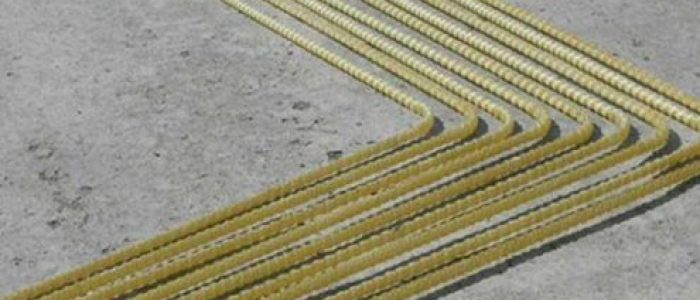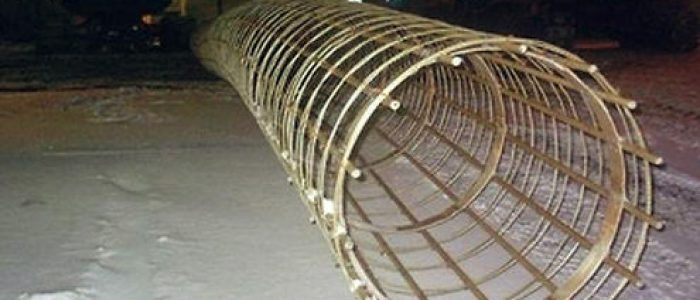Introducing GFRP Bent Rebar
GFRP (Glass Fiber Reinforced Polymer) bent rebar is a cutting-edge construction material made from glass fibers reinforced with polymer resins. Known for its exceptional strength and flexibility, this material is ideal for use in various construction projects requiring curved profiles. GFRP bent elements are used to reinforce concrete in structures that necessitate specific shapes and configurations.
Civil Projects

Road Construction
GFRP bent rebar is used in the construction of highways, tunnels, and bridges. Its corrosion resistance makes it particularly suitable for road projects exposed to de-icing salts and other harsh environmental conditions.

Marine Structures
Ideal for constructing piers, docks, and other marine infrastructure, GFRP bent rebar offers superior performance in saltwater environments.

Architectural Projects
Used in building facades and decorative elements, GFRP rebar allows for the creation of complex and aesthetically pleasing designs.

Repair and Rehabilitation
GFRP bent rebar is employed in the rehabilitation and reinforcement of damaged concrete structures, extending their service life.
Specific Use Cases

Highways and Tunnels
GFRP rebar’s high tensile strength and non-corrosive properties ensure durability and longevity in structures exposed to continuous traffic and environmental stress.

Bridges
The lightweight nature of GFRP reduces the overall load on the structure, improving efficiency and reducing construction time.

Marine Applications
Its immunity to salt and chemicals makes GFRP ideal for long-term performance in harsh marine conditions.

Architectural Elements
Flexibility in design allows for innovative architectural solutions, providing both functional reinforcement and aesthetic enhancement.

Benefits of GFRP Curved Rebar
- Corrosion Resistance. GFRP bent rebar is not susceptible to corrosion, unlike traditional steel rebar. This quality significantly extends the lifespan of structures, reducing maintenance costs and enhancing safety.
- High Chemical Resistance. GFRP bent elements do not rust and are immune to salt ions, chemicals, and the inherent alkalinity of concrete. This makes them particularly suitable for use in chemically aggressive environments.
- Lightweight. GFRP curved rebar is significantly lighter than steel, facilitating easier handling and installation. For example, GFRP rebar can weigh up to 75% less than its steel counterpart, resulting in lower transportation and labor costs.
- High Strength. GFRP curved forms have high tensile strength, providing reliable reinforcement for concrete and enhancing the durability of structures. The tensile strength of GFRP rebar can be up to twice that of steel, making it an excellent choice for high-stress applications.
- Flexibility and Adaptability. The ability to create bent elements allows GFRP rebar to be used in structures with complex geometry. This opens new possibilities for architectural solutions and the design of unique buildings. GFRP can be molded into various shapes without compromising its structural integrity.
GFRP Bent Rebar vs. Steel Bent Rebar
| Characteristics | GFRP Bent Rebar | Steel Bent Rebar |
|---|---|---|
| Electric conductivity | Non-conductive | Conductive |
| Thermal conductivity | Low | High |
| Corrosion resistance | High | Low |
| Heavy load resistance | No permanent deformation | Can be permanently deformed |
| Magnetic properties | Diamagnetic | Conductor |
| Durability | Not less than 80 years | According to building codes |
| Working temperature range | –70°C to +150°C | –70°C to +50°C |
Advantages of Using GFRP Curved Rebar
- Easy and Rapid Installation: The lightweight and flexible nature of GFRP rebar make it easy to transport and install, reducing overall construction time.
- Minimized Waste: The ability to pre-fabricate GFRP elements to precise specifications minimizes waste on the construction site.
- Reduced Maintenance Costs: The superior durability and corrosion resistance of GFRP rebar reduce the need for frequent maintenance and repairs, resulting in significant cost savings over the lifespan of the structure.
GFRP bent rebar represents a significant advancement in construction materials, offering a blend of high strength, flexibility, and resistance to environmental factors. Its application in various construction projects not only enhances structural integrity but also opens new possibilities for innovative design and efficient construction practices.


